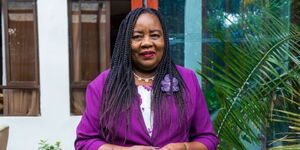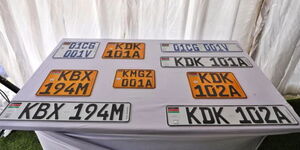Kenyan legal scholar and professor Phoebe Okowa has been elected as a judge in the International Court of Justice, an organ in the United Nations, following months of lobbying by the Kenyan government.
Okowa was elected to the prestigious post after four rounds of voting by both the UN General Assembly and the UN Security Council, trouncing three other candidates.
In a statement by the UNSC, Okowa was elected by an absolute majority, and she will join 14 other judges at the ICJ. Judges serve for a term of nine years, with elections for one-third (five) of the seats held every three years to ensure continuity.
“I have the honour to inform you that, at the 10040th meeting of the Security Council held on 12 November 2025 for the purpose of electing a member of the International Court of Justice to fill the seat that became vacant on 30 September 2025, Ms Phoebe Okowa (Kenya) obtained an absolute majority of votes in the Security Council. Accept, Excellency, the renewed assurances of my highest consideration,” noted Michael Imran Kanu, President of the UNSC.
In getting elected at the ICJ, Okowa has become the first Kenyan by birth to ascend to the role and the fifth African to be an ICJ judge.
However, Okowa will be the first Kenyan to serve at the ICJ since Judge Abdulqawi Ahmed Yusuf. Though originally from Somalia, Yusuf is a naturalised Kenyan citizen and was elected as a judge of the ICJ in 2009, re-elected in 2018, and even served as the President of the ICJ from 2018 to 2021. He was the first African judge to hold the ICJ presidency since 1994.
About the ICJ and its Voting Process
The ICJ is the principal judicial organ of the United Nations (UN). Its main role is to settle legal disputes between states and give advisory opinions on legal questions referred to it by UN organs and specialised agencies.
Judges are not nominated by governments directly but by national groups in the Permanent Court of Arbitration (PCA). Each national group (usually consisting of respected jurists from each country) can nominate up to four candidates, two of whom may be of their own nationality.
The elections take place within the United Nations General Assembly (UNGA) and the United Nations Security Council (UNSC) simultaneously but separately. A candidate must receive an absolute majority of votes in both the UNGA and the UNSC to be elected.
For the absolute majority in the UNGA, one must get at least 97 votes (out of 193 member states), while for the absolute majority in the UNSC, one must get at least 8 votes (out of 15 members).
About Phoebe Okowa
Before becoming an ICJ judge, Okowa was in the International Law Commission, currently serving a five-year term that began on January 1, 2023, becoming the first African woman to serve as a member.
An advocate of the High Court of Kenya, Okowa carries years of legal experience, particularly on the international front, giving her great credibility as an ICJ judge.
An Oxford PhD graduate, she has acted as counsel and consultant to governments and non-governmental organisations on questions of international law before domestic and international courts, including the ICJ.
The ICJ’s statutes dictate that judges must be of high moral character and possess recognised competence in international law. Further, the court should have a fair representation of the world’s major legal systems. Another rule is that no two judges can be from the same country.
After her victory, multiple nations sent their congratulatory messages to Kenya and Okowa, signifying the culmination of an intensive eight-month lobbying process that began in March, when she was initially nominated.












